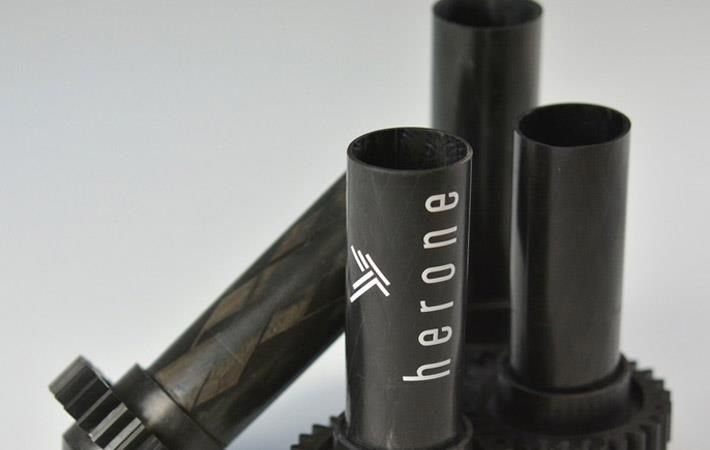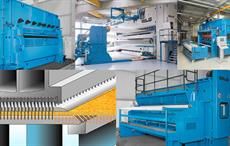
Herone’s all-thermoplastic drive-shaft system holds enormous potential and serves as further evidence that Victrex has introduced the next dimension of thermoplastic composites for use in aerospace based on its high-performing Victrex Paek polymer solutions, said Victrex in a press release.
The drive shaft is formed from ‘organotubes’, which are braided preforms made out of fully consolidated thermoplastic UD tapes, in this case, Victrex Ae 250 unidirectional tape (UDT), a carbon fibre Paek composite. The process was developed by the Institute of Lightweight Engineering and Polymer Technology (TU Dresden) and Herone GmbH for use in the manufacture of high quality continuous carbon fibre Paek composite hollow profiles. The organotubes are then overmoulded with Victrex Peek 90hmf40, a carbon fibre Peek composite to incorporate the integral gear.
“We are extremely pleased to have won this JEC award, which means so much to everyone working in the exciting field of composites,” said Daniel Barfuss, managing partner at Herone GmbH. “The solution is a result of converging innovations – hollow profile technology and the hybrid overmoulding technique developed by Victrex. This is teamwork in action, together we are pushing the boundaries of composite technologies in aerospace.”
By using thermoplastic tapes to form the organotubes, the challenging and time-consuming process step of impregnating the carbon filaments with thermoplastic matrix material is already completed prior to preforming. This opens the potential for significantly reduced cycle times and increases the process efficiency for the composite profile production within the hollow profile press process. Furthermore, braiding enables high deposition rates and makes the process suitable for large-scale industrial production.
For incorporating the gears, injection overmoulding creates cohesive molecular bond between the shaft and the gear while the drive shaft is simultaneously thermoformed to create a form-lock between the gear and the drive shaft, to further enhance the strength of the interface.
The Victrex Ae 250 composite has a melting temperature of around 40°C (104°F) lower than Victrex’s short carbon fibre-reinforced Peek 90hmf40. With the difference of 40°C (104°F) in the melting temperature, there is no need to pre-heat the matrix polymer of the shaft beyond its melting temperature prior to injection overmoulding. This processing approach, on the part of Victrex, is known as ‘hybrid overmoulding’ and results in enormously improved resource efficiency, process reliability and interface strength.
Herone and Victrex expect the many advantages of the new thermoplastic solution to translate into tangible key benefits, including: enhanced part quality, fast cycle, cost reduction, increased performance. Final forming of the composite tubing during the injection process creates the form-locking geometry and its unique features.
“In the aerospace industry, cost and manufacturing throughput are the primary drivers for innovations,” said Frank Schemm, aerospace sales team leader at Victrex. “Herone and Victrex are together pioneering composite solutions for commercial aerospace that enable components to be manufactured faster, in higher part counts and with the potential for cost savings. Innovative consolidation techniques of thermoplastic materials differ considerably from metal or thermoset processing. Fully functional design features can be integrated in fewer manufacturing steps. We congratulate Herone on this award for a composite solution that we are confident will see high market demand in a rapidly evolving industry. In particular, the strongly growing branch of electrical vertical take-off and landing (eVTOL) vehicles, the so called flying taxis, demand much higher production rates than classical legacy programmes.” (PC)
Fibre2Fashion News Desk – India

